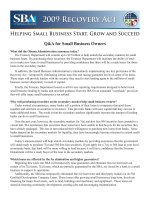Recruiting amd selecting employees for small business
Bạn đang xem bản rút gọn của tài liệu. Xem và tải ngay bản đầy đủ của tài liệu tại đây (508.44 KB, 27 trang )
Recruiting and Selecting
Employees
For the Small Business
BUS 207 Session #1
Spring 2006 copyright,
Self- Employment has
Advantages… and Disadvantages
A disadvantage of being self-employed
is you may not have anyone to help
out.
You ARE #1 in your business.
The problem is you might be the
only one.
If you ARE the business, you
undoubtedly have a lot of
responsibilities, and very little time to
“take a break”, let alone a vacation!
Self-Employment: Limited Capacity
How does a self-employed
person spend their time?:
25 hours per week producing the
product or “billable hours.”
10 hours marketing.
5+ hours on administrativemanagement activities.
At $50 per billable hour, that is:
$1250 per week, $5416 per month,
or $65,000 per year, before
expenses AND before a vacation!
Limited Capacity and Life
(of a sole proprietor)
The business is reliant on you.
Without you, there isn’t any revenue
coming in.
If you get sick, you don’t have a
back-up.
If you go on vacation…it’s “un-paid.”
After 10, 15, or 20 years, when you
want to retire, what do you have to
sell?
Does the business retire with you?
Advantages to Hiring Employees
They can be trained to run the
business in your absence.
You are setting up an
infrastructure that perhaps you
can pass on or sell to someone.
You can delegate the admin
jobs (or the stuff you don’t enjoy).
You can expand your business
past the single-person capacity!
Making the Decision: Expand or Not!?
Like starting a business, the decision to
expand and take on employees, should not
be taken lightly!
Ask Yourself these questions:
1) Are you ready to expand?
2) Can you afford it? (Do a Pro-forma
Projection)
3) Are you ready to take on more
management responsibilities?
4) Are you ready to give up control?
5) Can you take on more risk?
Other Considerations Before
Starting the Hiring Process
What do I really Need the Employee
to do? Do a Job Analysis and then
establish a Preliminary Job
Description.
Establish the future-employee’s
“wage rates.” Are you competitive?
Will this employee get benefits or be
an “exempt” employee?
Develop a typical work schedule.
Revise the Organizational Chart.
Employment Legal Issues
Before You Recruit Understand the Legal Guidelines
Fair Labor Standards Act
Workers must be identified as
non-exempt or exempt.
Business that make less than
$500,000 MAY HAVE
EXEMPTIONS ( BUT CHECK!!!)
Non-exempt must be paid at
least the minimum wage and
receive over-time pay after
40hours at 1.5 times ( see state
law)
Equal Pay for Equal Work!
Stiff Penalties for Abusing Wage Laws
• Ignorance is not an excuse.
• Many small businesses have
received stiff penalties and fines
for violating state wage laws and
the FSLA.
• Fines of $1,000 per employee if
classification of exempt-nonexempt is incorrect.
• Exempt employee must be
executive, administrative or
professional employee with min
salary of $250 per week.
MORE Employment Laws to
Review
• Title VII of Civil Rights Act - companies
with 15 or more employees: Prohibits
discrimination.
• Equal Pay Act - Amended Title VII
• American Disabilities Act- ADA prevents discrimination due to
disabilities
• National Labor Relations Act- Right to
Form Union
• Age Discrimination in Employment Act companies with 20 or more employees
And MORE Employment Laws
• Family & Medical Leave ActCompanies with 50+
employees.
• Occupational Safety &
Health ACT- OSHA- ALL
Businesses
• Worker’s Compensationmandatory “insurance”
• Immigration Reform &
Control Act & Immigration
Act- All businesses
Immigration Law Acts and How that
Impacts Your Hiring Procedures
The Immigration Acts of 1990s
were enacted to prevent illegal
aliens form working in the U.S.
You are required to have new
employees fill out an I-9 or
Employment Eligibility Verification
Form.
The Company must retained the
form at the business location.
Fines are imposed if you do not
have proper documentation.
OSHA: Occupational Safety &
Health Act
• Law designed to reduce
workplace hazards &
improve health & safety
programs for workers.
• OSHA does not apply if:
- your self-employed
- your business is a farm
that employs your family
- mining business (has
other regulations)
OSHA Posting & Reporting
• You must post a notice
called “Job Safety &
Health Protection.”
• Many specific industries
(restaurants) have other
notices that must be
posted.
• Keep records of safety if
you have ten or more
employees, for over 10
years.
Alternatives to Hiring an Employee
• Source out work to other small
businesses.
This works well for certain administrative
jobs like-
payroll, bookkeeping, security,
cleaning
• Use a Staffing Agency
This works well for part-time help
or seasonal help & when you don’t
want to deal with the paperwork.
• Take on Independent Contractors
Options for Recruiting Quality
Employees
Places or Postings
Newspaper Ads
Internet Sites
Bulletin Boardsinternal & external
Employment
Agencies
Postings at
Universities or
colleges
People, Organizations
Referrals
Internal Recruiting
Staffing Agencies
“Head-hunters”
College Campus
Through referrals
Government
Employment
Agencies (EDD)
Using a Staffing Agency
• The person who they
send to you is technically
an employee of the
Staffing Agency.
• The Staffing Agency
deals with payroll,
checks, tax forms.
• You pay a hire amount to
the Staffing Agency and
they pay the employee.
Pro’s and Con’s of Hiring Staffing
Agency Employees
o
o
o
o
Pros
Often quicker than
recruiting yourself
Staffer is screened
through Staff Agency
No employment
paperwork (payroll,
taxes, etc.)
Use for a limited period
without “hiring.”
Con’s
o Hourly rate is
significantly higher
than yours.
o Less control on who
they send to you.
o Many temporary firms
will not have the
employee that has
technical experience
you may need.
Independent Contractor vs.
Employee
The use of an Independent Contractor or IC
has been a critical issue in the last 2 decades.
The IRS and the EDD enforce a social policy
that states people should be employees
(whenever possible).
The policy is to protect employees (not to
punish small businesses).
BE AWARE of the differences between an IC
and an Employee.
The IRS has developed “Twenty Common
Law Factors” TEST to determine the status
IC Checklist
No instructions
No Training
Services do not
have to be rendered
personally
Work NOT essential
to firm
IC sets hours
No on-going
relationship
IC’s have other work
IC’s determine job
location
IC’s pay business
expenses
IC’s have own tools
IC’s can make profit
or loss
IC’s cannot be fired
at will
Independent Contractor vs.
Employee…the risk
• If the Independent Contractor works and acts
more like an employee…the government is going
to say they are an employee.
• The RISK often comes after the IC leaves and
tries to collect unemployment compensation.
• You would pay ALL back payroll taxes & other
penalties.
• The lesson here is to make sure you have the
necessary documentation that shows they are a
true Independent Contractor
IC Documentation Files
Copy of their own
business license.
Hold harmless (and
possibly) conflict of
interest agreement.
Form with Twenty Factor
Checklist that they have
signed
Current and past
contacts
What about “under-the-table?”
It’s true, many small
business owners will
pay people “under-thetable” for services
rendered.
Funny thing is the
government doesn’t
have statistics.
Remember. it's your
business, so it is your
risk!
EDD Services
• The EDD does more than help you file for
unemployment insurance or fill out an EIN.
• The EDD has the largest on-line Job Bank,
where you can post your vacancy or look for
qualified candidates: caljobs.org
• The EDD can help you find qualified workers
and in the past have offered on the Job
Training Programs (where they may pay half
of the salary)









